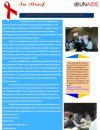-

Accelerating Access To HIV Treatment
17 June 2014
In 2012, 347 000 people in the Region wereliving with HIV, a 127% increase over thenumber living with HIV in 2001. Even as newinfections continue to decline worldwide,there are disturbing signs that the Region’sepidemic is worsening. Among the world’sregions, HIV incidence is increasing fastest inthe Region, with the annual number of newinfections rising by more than 124% from2001 to 2012 (7).Although, the percentage of the generaladult population living with HIV in theRegion is among the lowest globally, certainpopulations have been disproportionatelyaffected. These populations include menwho have sex with men, people who injectdrugs, prisoners, and sex workers andtheir clients. Epidemiological studies havedocumented elevated HIV prevalence amongkey populations in many settings – withrecent surveys reporting levels reaching upto 87% among people who inject drugs and18% among prisoners in Libya (8), 15.4%among female sex workers in Djibouti, and13% among men who have sex with men inTunisia.Adult HIV prevalence exceeds 1% in Djiboutiand parts of Somalia, qualifying them as“generalized” epidemics, although keypopulations at higher risk of HIV exposure account for the large proportion of newinfections in these countries as well (9).Considerable geographical variation inHIV burden is reported within individualcountries.
-

-

Arab Convention on the prevention of HIV/AIDS and the protection of Rights of People living with HIV with HIV/AIDS (In its final form)
17 June 2014
The Arab State Parties to this Convention,1. Out of the Arab nation’s belief in human dignity and in the right to a dignified life based on freedom, justice, equality and equal opportunities, and in accordance with the provisions of Islamic Shari’a and international conventions and principles of the United Nations’ Charter against all forms discrimination based on religion, race or color,2. Recognizing the importance of the guidelines on policies and measures contained in the Declaration of Political Commitment on HIV, and the resolution of the Human Rights Council on the protection of human rights in the context of HIV in the promotion, formulation and evaluation of policies, plans, programs and actions at the national, regional and international levels to increase equal opportunities for people living with HIV, and to ensure that laws, policies and practices on HIV are sensitive to human rights,
-

Doha Call to Action
17 June 2014
We, the representatives of civil society, academia, policy makers and individuals participating in the International Conference organized in Doha, Qatar on the 16-17 of April, 2014 by the Doha International Family Institute (DIFI), member of Qatar Foundation for Education, Science and Community Development, to commemorate the twentieth anniversary of the International Year of the Family;Having considered the conference theme “Empowering Families: A Pathway to Development,”Reaffirming that the family is not only the fundamental group unit of society but is also the fundamental agent for sustainable, social, economic and cultural development,Stressing the importance of designing, implementing and monitoring family-oriented policies, especially in the areas of poverty eradication, full employment and decent work, work family balance and social integration and intergenerational solidarity,Emphasizing that the achievement of development goals especially those relating to the eradication of poverty, education of children, especially girls and reduction in maternal mortality depends, to a significant extent, on how families are empowered to fulfill their numerous functions,Emphasizing further that strategic focus on families offers a comprehensive approach to solving some of the persistent development challenges such as inequality and social exclusion,
-

Call To Action Vienna
17 June 2014
We, people involved with the HIV epidemic in conservative social settings as religious leaders, civil society actors, people living with HIV, and well-informed experts, gathered for the consultation meeting entitled “Overcoming HIV in Conservative Social Settings” on 29-30 April 2014, hosted by OFID in Vienna, Austria. Our aim was to increase understanding about the current status of HIV in conservative social settings, particularly amongst vulnerable, highly-affected, and underserved communities, known as Key Affected Populations (KAPs). After having considered the challenges, successes and good practices, we call for urgent action to improve the lives of those infected and affected by HIV/AIDS in conservative social settings in the form of an evidence-based response to HIV. We, the participants of this meeting, recognize and support the human rights of people living with HIV. We recognize that the epidemic in the region is concentrated, disproportionately affecting Key Affected Populations, namely sex workers, people who inject drugs, and men who have sex with men. However, these populations are integral members of society and there is a real need for greater awareness of HIV issues among the wider public. The current situation shows high levels of stigma and discrimination, low coverage of HIV testing and counselling as well as low treatment coverage and adherence, a lack of demand for comprehensive HIV services, and the continued enforcement of discriminatory, stigmatizing and harmful laws targeting Key Affected Populations in most countries within conservative settings. The prevalence of civil unrest, instability, as well as the low status of women and the poor protection of rights of migrant workers add to the complexity of the situation.
-

-

-

-

-










